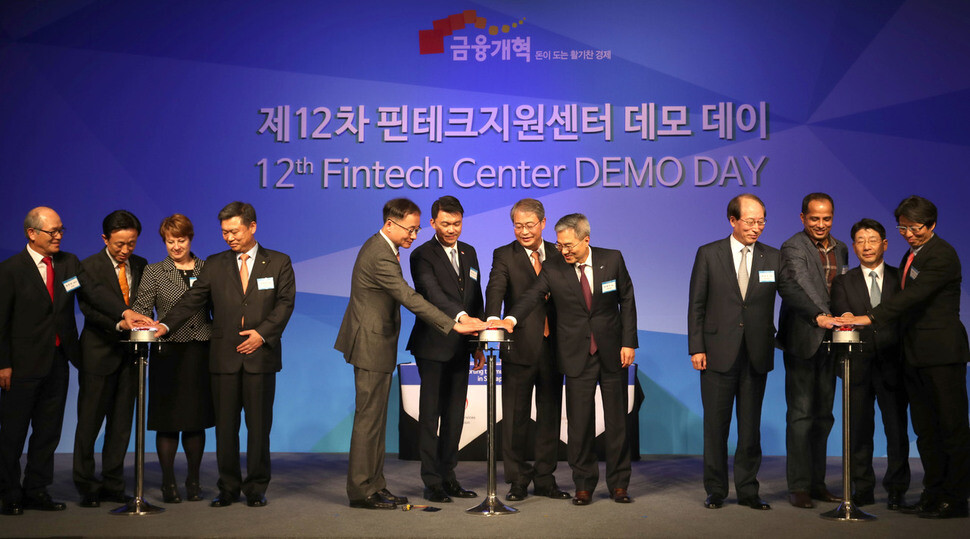hankyoreh
Links to other country sites 다른 나라 사이트 링크
South Korea planning digital currency along the lines of Bitcoin

The South Korean government is planning the full-scale institutionalization of a digital currency along the lines of Bitcoin.
It also announced plans to support joint research and testing by the financial community and fintech companies within the year for blockchain, which has been drawing global attention as the underlying technology for Bitcoin.
Financial Services Commission (FSC) Chairman Yim Jong-yong shared the outline of this “second-stage fintech development roadmap” while attending the 12th Demo Day and an opening ceremony for an integrated fintech portal on Oct. 24 at the Nine Tree convention center in Seoul’s Jongno district.
“Where the first-stage fintech development roadmap was focused on removing irrational regulations, the second stage will be focused on redesigning current systems to make them more suited to the fintech environment,” Lim explained.
The message was that while the first stage was about fostering the area, the second stage will shift focus to developing it. To this end, policy loan support for fintech businesses is to be increased from 500 billion won (US$439 million) per year to one trillion won (US$879 million). This year, the Korea Development Bank (KDB) and Industrial Bank of Korea (IBK) provided 500 billion won in support - while the new plan calls for an infusion of 3 trillion won (US$2.64 billion) from 2017 to 2019.
Plans were also announced for the institutionalization of digital currencies like Bitcoin in keeping with trends in international usage in places like the US and Japan.
“There’s still no legal definition for ‘digital currency.’ We plan to start work by coming up with a legal definition so that we can respond to issues involving tax payment, money laundering, and consumer protection,” explained an FSC source.
“We may be presenting the legal definition and specific plans in the fintech development roadmap by the first quarter of next year,” the source added.
The government is also supporting the establishment and operation of a blockchain consortium combining fintech companies with financial institutions. Blockchain is a system in which accounts containing financial transaction information are recorded and managed jointly by transaction participants rather than financial institutions. It‘s a technology with low transaction fees and high security. As of next month, Kookmin Bank (KB) and the fintech company Coinplug plan to introduce a personal authentication system using blockchain technology for the KB credit card. Other financial companies are planning to launch similar items. In a World Economic Forum (Davos Forum) report last year on technology ripple effects, blockchain was cited one of 21 technologies with the potential to change society.
“Blockchain technology is emerging a key part of future financial infrastructure,” said Lim.
Another plan involves providing a “financial regulation test bed” system that would allow companies to test new fintech services free from regulatory burdens. A comprehensive reexamination is also being planned for regulations on authentication and identity confirmation, currently a stumbling block for non-face-to-face financial transactions that do not require users to visit a bank, securities company, or other financial institution.
The FSC also signed a memorandum of understanding the same day for fintech collaboration with the Monetary Authority of Singapore (MAS). It’s the second fintech-related work agreement signed by the FSC with a foreign financial authority, after another established with the United Kingdom’s Financial Conduct Authority (FCA) in July.
By Lee Jeong-hun, staff reporter
Please direct questions or comments to [english@hani.co.kr]

Editorial・opinion
![[Column] Park Geun-hye déjà vu in Yoon Suk-yeol [Column] Park Geun-hye déjà vu in Yoon Suk-yeol](https://flexible.img.hani.co.kr/flexible/normal/500/300/imgdb/original/2024/0424/651713945113788.jpg) [Column] Park Geun-hye déjà vu in Yoon Suk-yeol
[Column] Park Geun-hye déjà vu in Yoon Suk-yeol![[Editorial] New weight of N. Korea’s nuclear threats makes dialogue all the more urgent [Editorial] New weight of N. Korea’s nuclear threats makes dialogue all the more urgent](https://flexible.img.hani.co.kr/flexible/normal/500/300/imgdb/original/2024/0424/7317139454662664.jpg) [Editorial] New weight of N. Korea’s nuclear threats makes dialogue all the more urgent
[Editorial] New weight of N. Korea’s nuclear threats makes dialogue all the more urgent- [Guest essay] The real reason Korea’s new right wants to dub Rhee a founding father
- [Column] ‘Choson’: Is it time we start referring to N. Korea in its own terms?
- [Editorial] Japan’s rewriting of history with Korea has gone too far
- [Column] The president’s questionable capacity for dialogue
- [Column] Are chaebol firms just pizza pies for families to divvy up as they please?
- [Column] Has Korea, too, crossed the Rubicon on China?
- [Correspondent’s column] In Japan’s alliance with US, echoes of its past alliances with UK
- [Editorial] Does Yoon think the Korean public is wrong?
Most viewed articles
- 1‘We must say no’: Seoul defense chief on Korean, USFK involvement in hypothetical Taiwan crisis
- 2[Reportage] On US campuses, student risk arrest as they call for divestment from Israel
- 3[Column] Park Geun-hye déjà vu in Yoon Suk-yeol
- 4‘Weddingflation’ breaks the bank for Korean couples-to-be
- 5Korea sees more deaths than births for 52nd consecutive month in February
- 6N. Korean delegation’s trip to Iran shows how Pyongyang is leveraging ties with Moscow
- 7Amnesty notes ‘erosion’ of freedom of expression in Korea in annual human rights report
- 8Will NewJeans end up collateral damage in internal feud at K-pop juggernaut Hybe?
- 9N. Korean hackers breached 10 defense contractors in South for months, police say
- 10[Guest essay] The real reason Korea’s new right wants to dub Rhee a founding father